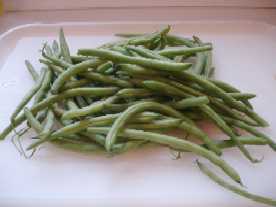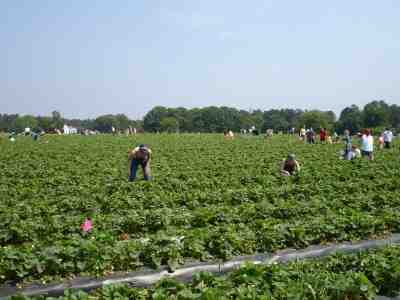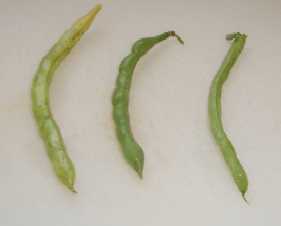
Bean U-Pick Orchards in Northeastern North Carolina in 2025, by county
Below are the U-Pick orchards and farms for beans that we know of in this area.
Not all areas of a state have beans farms that are open to the public. If you know of any others, please tell us using the add a farm form!
Remember to always check with the farm's own website or Facebook page before you go - or call or email them if they don't have a website or Facebook page. Conditions at the farms and crops can change literally overnight, so if you want to avoid a wasted trip out there - check with the farm directly before you go! If I cannot reach them, I DON'T GO!
PLEASE report closed farms, broken links and incorrect info using the "Report Corrections" form below.
New! As inflation remains high, see this page for
reliable (tested) brands of generic canning lids at lower
costs, and cost-saving measures for
getting fruit and vegetables and home canning.
If you are having a hard time
finding canning lids, I've used these, and they're a great price & ship in 2 days.
New! Road tripping and camping is a great way to have a fun, safe and inexpensive family trip. The national and state parks and monuments are open, and campgrounds usually cost between $10 and $40 per night. September to November is the best camping weather. See our new website Road Tripping and Camping.com for tips, tricks, guides, checklists and info about parks, monuments and other places to visit.
New! We just went live with our latest website, FunFactoryTours.com - As they name implies, you can find a fun factory tour, including chocolate, automobiles, historical forts and sites, famous buildings, Active Federal facilities even fun geology: like fossils and volcanic areas
Chowan County
- Winborne Bros Farm - Beans, Cantaloupes, Corn, Gourds, HayBales, Pumpkins, Sweet Potatoes, Tomatoes, Watermelon, Hay Rides
3443 Rocky Hock Road, Edenton, NC 27932. Phone: (252) 221-4204. Open: Sunday noon-7 pm, Monday to Saturday 9 am to 7 pm; July 4 thru October 31. Directions: North of Edenton off Hwy 32, turn on Rocky Hock Road at Smalls Crossroads then go 2.2 miles. Farm on right. Click here for a map and directions. Crop availability: Cantaloupe, Watermelon, Tomatoes & Butterbeans - July-August Sweet Potatoes, Pumpkins, Indian Corn, Gourds & mini haybales - September-October. Hayrides for school children
[ Click here to update the listing ]
Currituck County
- Coinjock Creek Farms - beans, beets, blueberries, broad beans, broccoli, carrots, corn (sweet), cucumbers, eggplants, figs, onions, peas, peppers, summer squash, winter squash, tomatoes, other vegetables, Other fruit or veg,
180 Maple Road, Maple, NC 27956. Phone: 252-267-3332. Email: info@coinjockcreek.com. Open: Monday through Sunday, 8 am to sunset; Call ahead!. Directions: From NC 168: turn onto Maple Road \\(SR1246\\); our farm is located .5 mile on the right. From US 158: turn onto Maple Road \\(SR1246\\); our farm is located 1.5 miles on the left. GPS Coordinates: Latitude 36.41207; Longitude -76.01002. Click here for a map and directions. Payment: Cash, Check. 5 mile on the right. From US 158: turn onto Maple Road (SR1246); our farm is located 1.5 miles on the left. GPS Coordinates: Latitude 36.41207; Longitude -76.01002. .
[ Click here to update the listing ] - Martin Orchard and Vineyards - permanently closed apples, beans, blackberries, broccoli, corn (sweet), cucumbers, eggplants, grapes, Muscadines, grapes, melons, pears, peaches, peppers, pumpkins, summer squash, tomatoes, other vegetables, picnic area you may bring your own food, weddings and wedding parties, Wineries, Muscadine grapes,
213 Martin Farm Lane, Knotts Island, NC 27950. Phone: . Email: martinfarmandwinery@gmail.com. Open: permanently closed. Click here for a map and directions.
Martin Orchard and Vineyards Facebook page. . f
[ Click here to update the listing ]
Halifax County
- Top Shelf Produce - beans, broad beans, U-pick and already picked
3100 Hedgepeth Road, Littleton, NC 27850. Phone: (252) 883-4527. Email: danwarren71@gmail.com. Open: July September. Directions: . Click here for a map and directions. Payment: Cash, only. ALL Wholesale order need prior noticeU-pick should call or email first to check availability Thanks(ADDED: June 26, 2017)
[ Click here to update the listing ]
Hertford County
- McCaskey Farms, Inc. - Beans, Broccoli, Cabbage, Collards, Corn, Greens, Peppers, Squash, Strawberries, Tomatoes, Vegetables, Cucumber
145 McCaskey Road, Ahoskie, NC 27910. Phone: (252) 332-2855. Open: Monday to Friday 8 am to 7 pm; April thru January. Directions: Located 5 miles outside Ahoskie between St. John and Union Communities off Hwy 461 on McCaskey Road. Only structure on left 12 mile after turning onto McCaskey Road. Click here for a map and directions. Crop availability: May Peas - May Strawberries - May-July Cabbage - May-July & October- December Salad - May-June & October- December Snaps, Tomatoes & Bell Peppers - June-July Sweet Corn - July Squash & Cucumbers - June-August Butter Beans & Field Peas - July, August & September Broccoli - October- December Collards - November-January.
[ Click here to update the listing ]
Corrections
Green Bean, Lima Bean, Shelled Beans Picking Tips, Recipes and Information
When are fresh beans available?
Beans are a warm weather crop, and won't grow much in cold soil. It takes them about 60 to 70 days from seed to harvest.
In the U.S. beans typically peak in harvesting from June through October in the South, and in July to September in the North. But they can be ready as early as early June in many places, if the weather is good.
Before you leave to go to the farm:
- Always call before you go to the farm - it's hard to pick in a muddy field!
- Most growers furnish picking containers designed for beans, but they may charge you for them; be sure to call before you go to see if you need to bring containers.
- Bring something to drink and a few snacks; you'd be surprised how you can work up a thirst and appetite! And don't forget hats and sunscreen for the sun. Bugs usually aren't a problem, but some deet might be good to bring along if it has been rainy.
Tips on How to Pick Beans
Whether you pick beans from your garden or at a Pick-Your-Own farm, here are a few tips to keep in mind.
Tips on How to Pick Green Beans
- Most beans these days are "stringless". That refers to a string, tough filament of the bean that runs along the outside from one end to the other. Some beans have two, one on each side; and some have one.
- I prefer to snap the bean off the plant just below where the stem attaches to the bean. If you do this, it will save time when you get home, because one end of the bean has already been trimmed. But this only makes sense if you will be using, cooking, canning or freezing the beans that day.
- If you won't be using the beans the same day, then break off the bean from the plant along the thin stem that connects the bean to the plant.
- The beans snap off pretty easily. hence the name "snap beans".
- Pole beans are the easiest to pick, because, since they grow up poles or twine, you don't have to squat down or bend over!
- Beans are ready for harvest when the pods are plump and firm, but not yet bulging. .
- In your own garden, pick your beans regularly to encourage more growth and prevent the pods from becoming tough and stringy.
- To harvest, hold the stem of the plant with one hand and gently snap the pod with the other..
Look for string, snap or green beans that are :
-
firm

- green (not yellowish - unless you're picking yellow beans!)
- smooth, not wrinkly on the surface - that's an old or dried out bean. Snap beans are best when the pods are firm and snap readily, but before the seeds within the pod develop. The tips should be pliable
- not lumpy - those lumps are the beans that are developed - that's an overripe green bean! Of course, if you want mature beans (not including the pod) then that's a different story, but we're talking about green beans here).
-
The beans in the photo at right are, from left:
- old and yellowing,
- overripe and lumpy; and
- dried out and damaged. - Avoid placing the picked beans in the sunlight any longer than necessary. It is better to put them in the shade of a tree or shed than in the car trunk or on the car seat. Cool them as soon as possible after picking. I prefer to bring a cooler with ice in it. Green Beans may be kept fresh in the refrigerator for 3 or 4 days
When you get home
- After harvesting, store your beans in the refrigerator or blanch and freeze them for longer storage.
- Put them in the vegetable crisper in the fridge, in a loose plastic bag.
- They will be good for about a week like that.
Bean recipes and home canning
Now, get ready to can or freeze the extra beans - It is VERY easy! Click on the links for easy instructions.
- How to can green beans, yellow beans, snap beans, broad beans, etc.
- How to make pickled beans
- How to freeze green beans (and other beans)
- How to Freeze Lima Beans, Broad beans, Butter Beans and/or Pinto Beans
- Canning fresh shelled beans
- Canned dried beans and peas (from kidney beans, peas, lima beans, broadbeans, chickpeas, pole beans, etc.)
- Canned Baked Beans With Tomato or Molasses Sauce
- Canned Baked Beans With Back, Pork or Ham and Tomato or Molasses Sauce -
- Pickled green beans
- Pickled Dill beans
- Mustard beans (pickled mustard beans)
- Pickled Three-Bean Salad
Varieties
There are many different types of beans, each with their own unique flavor, texture, and growing requirements. Some of the most popular varieties include:
- Green Beans: Also known as snap beans or string beans, green beans are a classic garden staple. They can be eaten fresh or cooked and come in bush and pole varieties.
- Lima Beans: Lima beans (called Broad Beans or Butter Beans in the UK) are a nutritious and protein-rich vegetable that can be eaten fresh or dried. They require a long growing season and prefer warm temperatures.
- Pole Beans: Pole beans are a climbing variety of bean that require support to grow. They can reach up to 10 feet tall and have a longer growing season than bush beans.
- Dried Beans: Dried beans are a versatile pantry staple that can be used in soups, stews, and other dishes. Popular varieties include black beans, navy beans, kidney beans, black beans, garbanzo (aka, chick peas) and pinto beans
- s, navy beans, kidney beans, black beans, garbanzo (aka, chick peas) and pinto beans
Other Local Farm Products (Honey, Horses, Milk, Meat, Eggs, Etc.)
(NOT pick-your-own, unless they are also listed above)
- Farm markets and roadside stands
- Local Honey Finder
- Local Meat, Milk and Eggs
- Venues: Farms, Wineries, Orchards for your event, wedding or party
- Easter egg hunts
- Children"s consignment sales
- Fruit and vegetable festivals
- Winery tours and wine tastings
- Horse rides, stables, lessons, trails
- Maple Syrup farms and sugarworks
- Bed & Breakfasts on Farms, Wineries, Ranches and Orchards
- Pumpkin patches
- Corn mazes
- Zombie Paintball venues
- Christmas Tree Farms & lots
- Environmental resources
- Consumer fraud information
- Wholesale food sources
- Resources for Farmers
Looking for canning equipment and supplies?
Water bath canner with a jar rack
Pressure canners for gas, electric and induction stoves: Presto 23Qt or T-fal 22Qt
Canning scoop (this one is PERFECT)
Ball Blue book (most recent version)
Jars: 8oz canning jars for jams
Find Other types of farms:
Farm markets and roadside stands
Road trips and camping resources
Local Honey, apiaries, beekeepers
Consumer fraud and scams information
Home canning supplies at the best prices on the internet!
Maple Syrup Farms, sugarworks, maple syrup festivals
Environmental information and resources
Farms For Your Event for birthday parties, weddings, receptions, business meetings, retreats, etc.
Festivals - local fruit and vegetable festivals
Get the
most recent version of
the Ball Blue Book
With this Presto 23 quart pressure canner and pressure cooker, you can "can" everything, fruits, vegetables, jams, jellies, salsa, applesauce, pickles, even meats, soups, stews. Model 01781

You can make jams, jellies, can fruit, applesauce, salsa and pickles with water bath canners, like this Granite Ware 12-Piece Canner Kit, Jar Rack, Blancher, Colander and 5 piece Canning Tool Set

